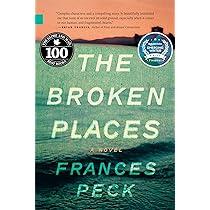
The natural disaster has been a trope in fiction (and movies) for decades. Usually what happens is that a group of strangers becomes isolated by an unexpected and massively destructive event. The ensuing drama chronicles the efforts of the unlucky individuals to cope with the challenges, dangers and deprivations they suddenly find themselves facing. The core of the story is built around the group’s attempts to cohere into a functioning unit and thereby increase the odds of survival as tensions arise and circumstances evolve — all while taking into account individual perspectives and whatever personal baggage each brings to the calamity.
The Broken Places, Frances Peck’s debut novel, offers a distinctively Canadian variation on the disaster narrative. The place is Vancouver, the time contemporary. On a typically beautiful morning in May, an earthquake shatters the city. It’s not quite “The Big One,” but big enough to cause widespread devastation and countless fatalities, and make headlines around the world.
The story the earthquake unleashes brings us into intimate contact with seven people, three men and four women — a motley crew in some respects, homogenous in others.
Peck’s characters — only some of whom are likable but all of whom are fascinating — begin the day in their separate spheres. Tensions are high all around, a situation brought about by secrets people have been harbouring, unspoken desires, mistrust, or frustration that has long simmered and which is now approaching a boiling point.
The Stedmans are a family of three: Tayne, Charlotte and 17-year-old daughter Sidney. Tayne is the CEO of a successful tech firm, a narcissist with huge expectations for himself and those around him who doesn’t accept failure or put up with weakness. Charlotte is the unaffectionate mother and put-upon wife who has over the years catered to her husband’s every whim but who is reaching the end of her endurance. Sidney, the troubled teen, fresh from rehab, recuperating from a drug addiction, is convinced her mother hates her and is constantly seeking her father’s affection. As the story begins, Charlotte is on her way, reluctantly, to the Fraser Valley in search of a particular brand of goat cheese that Tayne is insisting they serve at the dinner party planned for that evening. That morning, the air in the Stedman kitchen crackles with acrimony.
Gay partners Joe and Kyle are an unlikely pair. Kyle, a cosmetic surgeon, has a thriving medical practice. Joe works as a landscaper. They love each other but their relationship has recently become strained. Joe senses this, but has not been able to bring it up for fear Kyle will tell him the relationship is over. The morning of the earthquake, Joe is heading to the Stedman property where he has arranged to work for the day. Kyle tells Joe that he’s going in to his practice, but in fact he cancels his appointments and goes for a run in a mountainous park outside the city. Kyle spends this time alone agonizing over his recent infidelities and his betrayal of Joe.
Anna is a Ukrainian refugee, recently arrived in Canada, a closet alcoholic and illegal immigrant who, using forged credentials, has obtained a position as live-in nurse to 86-year-old Dorothy Lydell — “Miss Dodie” — a dementia sufferer. Anna fled her home in Ukraine’s Donetsk region when the Russians overran the town but not before suffering unspeakably at the hands of the invaders. On the fateful morning, Anna and Dodie have gone for a walk together and are outside the Stedman property when the earthquake hits. Joe rescues them from the street and brings them into the house.
From these emotionally charged components, Peck constructs an urgent, briskly paced narrative that, as catastrophe ravages the city, moves seamlessly among these individual perspectives. The Stedman home becomes the focal point of the action. After the quake, this is where Joe proves himself a rocksolid shield against further harm, a reliable source of practical knowledge that saves lives in a crisis. But he’s up against Tayne Stedman, who, since it’s his property, feels that he should be in charge, but whose behaviour is ruled by suspicion and pigheadedness, and who has not the slightest clue what the situation really demands. Meanwhile, Peck takes advantage of the external perspectives provided by Charlotte and Kyle to provide the reader with a broader picture of the prevailing chaos and how emergency crews are grappling with a tragedy of colossal proportions.
Throughout, Peck’s writing has a cinematic immediacy that, as the scene shifts, quickly immerses the reader in each character’s troubled psyche, revealing secrets, passions and deepest fears. Here is Anna, sneaking a drink and in an instant undergoing a familiar transformation:
No questions or nightmares. Nothing to hide. Easy times.
In addition to its page-turning qualities, The Broken Places is a thoughtful, intelligent novel. By exposing her characters to extremes of danger and stress, Peck demonstrates the human capacity for kindness and mindless self-regard, for resilience and weakness, in equal measure. Everyone here is shattered by loss, damaged, wounded. The quake levels the field, rendering everyone vulnerable, regardless of immigration or social status. In lesser hands such a story could tug at heartstrings. But Frances Peck avoids even the faintest whiff of sentimentality. The novel’s final chapter takes place ten years after the quake and reveals which of the characters has been broken by their experience, and not just survived but triumphed. It is not a pretty sight. But it is a profoundly moving one.
— Ian Colford’s novel, The Confessions of Joseph Blanchard, will be published by Guernica Editions in fall 2023.
You can find this review among others in Issue 297 Autumn 2023. Order the issue now:
Order Issue 297 - Autumn 2023 (Canadian Addresses)
Order Issue 297 - Autumn 2023 (International Addresses)











